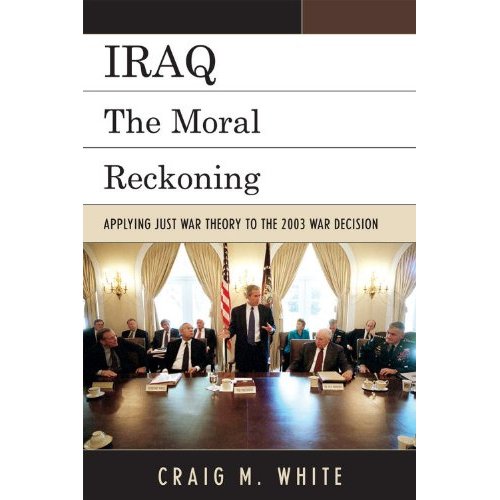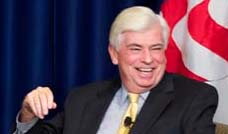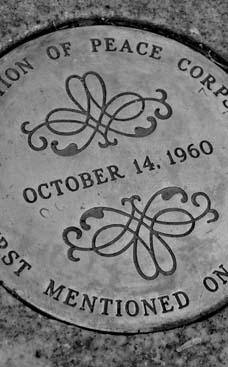
One day in 2006 I was fed up, and started writing the book I had thought someone else should write. For long months I spent my free time gathering facts and sources and articles, reading opposing points of view, studying the history of the theory, discussing the issues with scholars and experts, and praying and striving for a fair approach. (I learned a lot.) I wanted to appeal to the religious and quasi- and non-religious, to anyone willing to listen to reason. I meant the book to offer an alternative approach to both "conservative" and "liberal" friends, both of which groups, in my experience, far too often appear to judge wars more by the party of the president who starts them than by any objective criteria they can name. I wanted to share this wonderful intellectual tool I had discovered, the jus ad bellum (loosely, "right in going to war") branch of just war theory. The theory is wonderful because, carefully applied with an eye on a wide range of relevant facts, it shows convincingly whether a war, planned or present or past, is just or unjust.
Oman RPCV Craig White writes: How I came to write Iraq: The Moral Reckoning
A Classic Moral Theory and a War
How I came to write Iraq: The Moral Reckoning
by Craig White
by Craig White
Previously by Craig White: Just War?
As the U.S. rhetoric for war against Iraq heated up in 2002, I grew more and more outraged inside. After working as a Peace Corps volunteer in Oman, I had done further work in the Middle East, could speak Arabic, and had joined the State Department. (A fan of limited government, I felt that one of the core functions of the federal government was to engage in diplomacy with other nations, as well as to defend the country, if it was actually threatened.) I had a strong feeling that the planned war against Saddam violated the rules of common sense and morality, especially in light of Saddam's military weakness, past demonstrations that he could be deterred, and the doubt that had been cast on the Bush administration's case (in critiques often found in articles on Lew Rockwell's site).
In early 2003, my inchoate ideas on the war suddenly found a framework in a single sentence in an article in the magazine First Things that listed the six "classic" just war theory criteria for going to war: sovereign authority, just cause, right intention (including "the aim of peace,"), proportionality of ends, last resort, and reasonable chance of success. I was struck by the comprehensiveness and good sense of this list, and by how far the facts and these criteria were from supporting a verdict of "clearly a just war against Saddam Hussein." (Interestingly, the article was by George Weigel, by his own admission a neoconservative writer.)
I spent fruitless months trying to get First Things to organize a pro and con debate on whether the war in Iraq met the criteria, which led finally to my article "Just War?" in April 2005 on LewRockwell.com. That article led to new friendships and discussions. My personal outrage that my country had begun what I was convinced was an unjust war was aggravated by outrage that many scholars of just war theory, such as Weigel, were writing sloppy justifications for the war, sullying in my view the good name of the theory. In my difficult talks with family and conservative friends around this time, I often found they were unaware of crucial facts, and I was frustrated that I was sometimes vague on the details.
One day in 2006 I was fed up, and started writing the book I had thought someone else should write. For long months I spent my free time gathering facts and sources and articles, reading opposing points of view, studying the history of the theory, discussing the issues with scholars and experts, and praying and striving for a fair approach. (I learned a lot.) I wanted to appeal to the religious and quasi- and non-religious, to anyone willing to listen to reason. I meant the book to offer an alternative approach to both "conservative" and "liberal" friends, both of which groups, in my experience, far too often appear to judge wars more by the party of the president who starts them than by any objective criteria they can name. I wanted to share this wonderful intellectual tool I had discovered, the jus ad bellum (loosely, "right in going to war") branch of just war theory. The theory is wonderful because, carefully applied with an eye on a wide range of relevant facts, it shows convincingly whether a war, planned or present or past, is just or unjust.
In the end, the book became an in-depth consideration of each criterion in light of the facts available at the time, with a brief consideration of the history of the theory and other ethical concerns, and at least a chapter for each criterion. "Just cause" needed three chapters, including an entire chapter on the legal case a handful of British and American lawyers made that the war was an act of enforcement of UN Security Council resolutions. Along the way I offered the most thorough refutation I could of the neoconservatives who claimed that the war met the just war criteria. (My research led me to the conclusion that it met just one, with grave reservations, whereas a just war should meet all six at least substantially.) A sample of the refutation of neoconservative analyses is available on my book's blog, in the form of Chapter 11 of the book.
Why read a book on the Iraq war, which began so long ago? Because starting a war is one of the most serious actions a government can take, certainly in the realm of its relations with other governments. As citizens, "we the people" all share in some way in our nation's wars, which are made in our name: some oppose, some pay taxes (or not) in silence, others actively support. Because wars are so morally serious, leading to certain death, injury, and destruction even if they are just, this support or opposition is among the most morally serious acts we can undertake as citizens – and indifference on the subject is a serious flaw. In addition, a careful analysis of a war in the recent past can guide us as we look at present wars or possible wars in the future. It is my hope that a revived interest in just war theory will have a serious impact on our choices in the future. Many people are talking about just war theory – in Iraq: the Moral Reckoning I worked to show how it ought to be applied in detail. I'm very proud to say Ron Paul, and some others I admire, think I succeeded.
Disclaimer: the views expressed in this article are entirely my own, and in no way represent or are meant to represent those of the United States Department of State.













